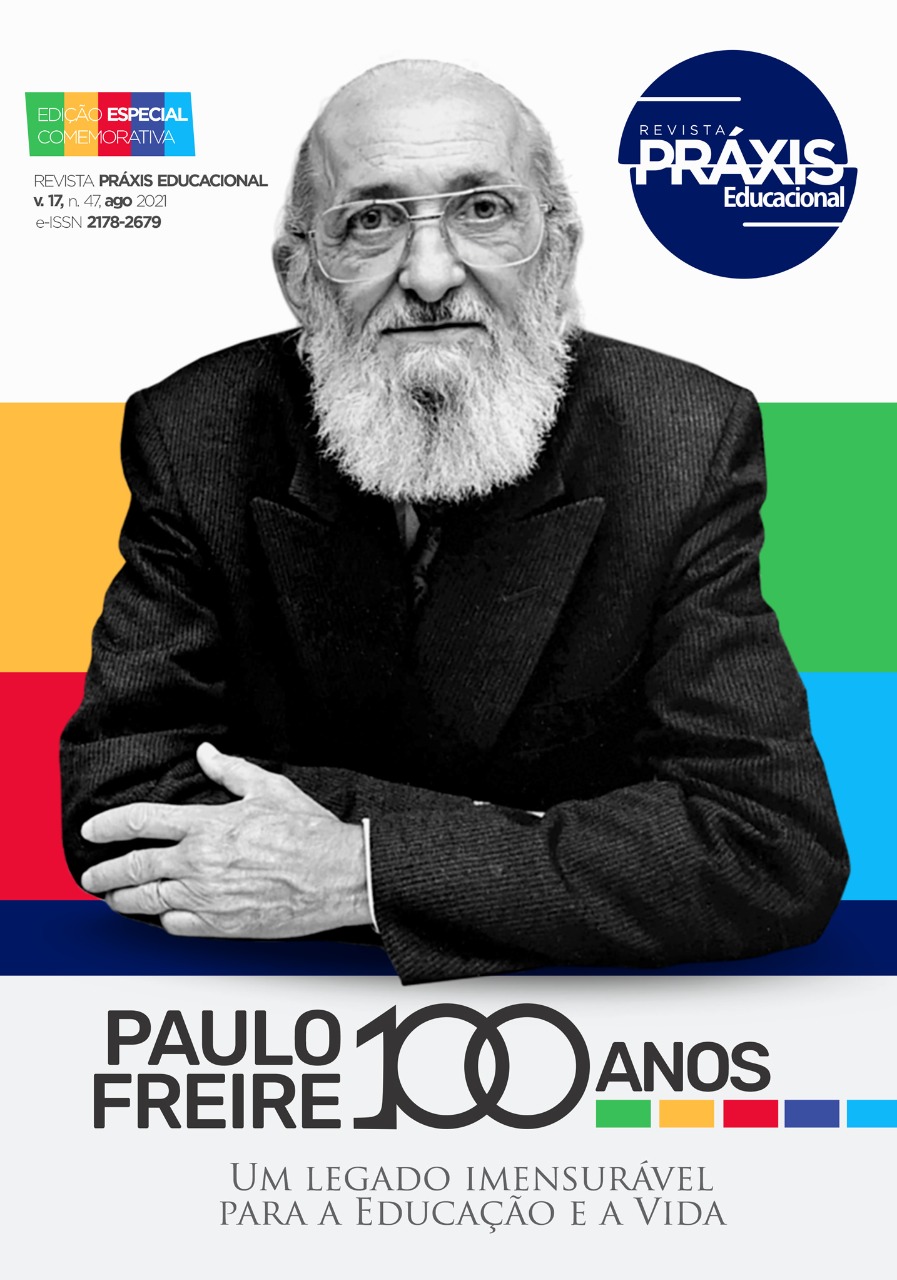Reading and library: paths to liberation
DOI:
https://doi.org/10.22481/praxisedu.v17i47.8552Keywords:
Reading - Public Library, Representation of the Information, Reading as Emancipatory PathAbstract
This article aims to present a comprehensive approach to the act of reading and the library as the core institution in terms of the reading experience. Hence it goes through the act of reading the world and its relation with the language emancipatory contexts carried out by humanity - in which the purpose of communicating is the first interest, but it gains complexity and further perspectives as it embodies the multiple possibilities of contents provided by the experience of reading. Initially, such a perspective is stricted. As they confront different visions and understandings of the same object, new means of comprehension emerge through a combination of contexts, speakers, readers, and writers. This emancipatory path tracked by the reading experience consists of the dialogical relationship between the reader and the writer, both parting from different standpoints, but joining efforts to build possible interpretations of the texts and their circumstantial contexts. In this context, Systems of Information Recovery, mainly operated by libraries, are able to provide the access to those documentary items, i.e., a book, to the users, in this case, the readers. The article reflects the character of these systems which
are designed to proved and solve access needs, but often do take into consideration cognitive aspects to succeed. Finally, it concludes that Brazilian people still find it difficult to access information that will help strengthen the citizenship environment, in this regard the Public Library is identified as the institution which can enable the social and citizenship contexts. Its mission must overcome the safeguarding of collections: it must act in order to provide and diffuse useful and relevant information that will promote the means to emancipation.
Downloads
Metrics
References
ALMEIDA JÚNIOR, O. F. Biblioteca pública: avaliação de serviço. Londrina: EDUEL, 2003.
BARTHES, Roland. Leitura. Enciclopédia Einaudi: oral/ escrito, argumentação. Rio de Janeiro: Imprensa Nacional, 1987.
BOURDIEU, Pierre. Coisas ditas. São Paulo: Brasiliense, 1990.
CALDIN, Clarice Fortkamp. A função social da leitura da literatura infantil. Encontros Bibli: Revista Eletrônica de Biblioteconomia e Ciência da Informação, v. 8, n. 15, 47-58 p.Disponível em: https://periodicos.ufsc.br/index.php/eb/article/view/1518-2924.2003v8n15p47. Acesso em: 25 arb. 2021.
CHARTIER, Roger. A aventura do livro: do leitor ao navegador. São Paulo: UNESP, 1999.
FEDERAÇÃO INTERNACIONAL DE ASSOCIAÇÕES E INSTITUIÇÕES BIBLIOTECÁRIAS. Diretrizes da Ifla Sobre os Serviços da Biblioteca Pública. Tradução de Margarida Oleiro. Lisboa: Direção Geral do Livro, dos Arquivos e das Bibliotecas, 2013. Disponível em: https://www.ifla.org/files/assets/hq/publications/series/147-pt.pdf. Acesso em: 22 abr. 2021.
FREIRE, Paulo. A importância do ato de ler: em três artigos que se completam. 28. ed. São Paulo, SP: Cortez, 1993. 87p.
GIL, F. Categorizar. In: ENCICLOPÉDIA EINAUDI, v. 41: Conhecimento. Lisboa: Imprensa Nacional-Casa da Moeda, 2000. p. 52-89
________. Classificações. In: ENCICLOPÉDIA EINAUDI, v. 41: Conhecimento. Lisboa: Imprensa Nacional-Casa da Moeda, 2000a. p. 90-110.
________. Conhecer. In: ENCICLOPÉDIA EINAUDI, v. 41: Conhecimento. Lisboa: Imprensa Nacional-Casa da Moeda, 2000b. p. 253-287.
________. Representar. In: ENCICLOPÉDIA EINAUDI, v.. 41: Conhecimento. Lisboa: Imprensa Nacional-Casa da Moeda, 2000c. p. 11-51.
ISER, Wolfgang. O ato da leitura: uma teoria do efeito estético. São Paulo: Ed. 34, 1996.
LINS, Ivana Aparecida Borges. Biblioteca Pública, convergências e divergências: Chile, Colômbia e Brasil. Orientadora: Kátia de Carvalho. 2016. 198 f. Tese (Doutorado em Ciência da Informação) – Instituto de Ciência da Informação, UFBA, Salvador, 2016.
NOVO, Hildenise Ferreira Novo. Análise conceitual e cognitiva: Modac - um modelo dinâmico para auxiliar a construção de Sistemas de Organização do Conhecimento (SOC). Orientadores: José Garcia Vivas Miranda e Teresinha FróesBurnham.2014. 173 f.Tese (Doutorado em Difusão do Conhecimento) – Faculdade de Educação, UFBA, Salvador, 2014.
OLMI, Alba; PERKOSKI, Norberto. Leitura e Cognição: uma abordagem transdisciplinar. Santa Cruz do Sul: Edunisc, 2005. 256 p.
RANGANATHAN, S. R. The Five Laws of Library Science. Madras: The Madras Library Association, 1931.
SILVA, Ana PricilaCeledonio da; CAVALCANTE, Lidia Eugenia; COSTA, Maria de Fátima Oliveira. O diálogo entre biblioteca e comunidade: um estudo de caso acerca do perfil e das percepções dos usuários das Bibliotecas Comunitárias de Itaitinga, Ceará. Perspect. Ciênc. Inf., Belo Horizonte , v. 23, n. 1, p. 39-54, jan. 2018 . Disponível em: http://www.scielo.br/scielo.php?script=sci_arttext&pid=S1413-99362018000100039&lng=en&nrm=iso. Acesso em: 19 abr. 2021.
SILVA, Ezequiel Theodoro da. Ato de ler: fundamentos psicológicos para uma nova pedagogia da leitura. São Paulo: Cortez/ Autores Associados, 1981.
SILVA, R. J. da. Leitura, biblioteca e política de formação de leitores no Brasil. Brazilian Journal of Information Science: research trends, [S. l.], v. 3, n. 2, 2010. Disponível em: https://revistas.marilia.unesp.br/index.php/bjis/article/view/464. Acesso em: 25 abr. 2021.
UNESCO. Manifesto da IFLA/UNESCO sobre Bibliotecas Públicas 1994. Disponível em: https://www.ifla.org/files/assets/public-libraries/publications/PL-manifesto/pl-manifesto-pt.pdf . Acesso em: 23 abr. 2021.
VYGOTSKY, Lev S. A formação social da mente. São Paulo: Martins Fontes, 2007.
VYGOTSKY, Lev S. Pensamento e linguagem. São Paulo: Martins Fontes, 2008.
Downloads
Published
How to Cite
Issue
Section
License
Copyright (c) 2021 Práxis Educacional

This work is licensed under a Creative Commons Attribution-ShareAlike 4.0 International License.
You are free to:
Share - copy and redistribute the material in any medium or format; Adapt - remix, transform, and build from the material for any purpose, even commercially. This license is acceptable for Free Cultural Works. The licensor cannot revoke these freedoms as long as you follow the terms of the license.
Under the following terms:
Attribution - You must appropriately give credit, provide a link to the license, and indicate if any changes have been made. You may do so in any reasonable way, but not in a way that suggests that you or your use is endorsed by the licensor.
There are no additional restrictions - You cannot apply legal terms or technological measures that legally restrict others to make any use permitted by the license.










